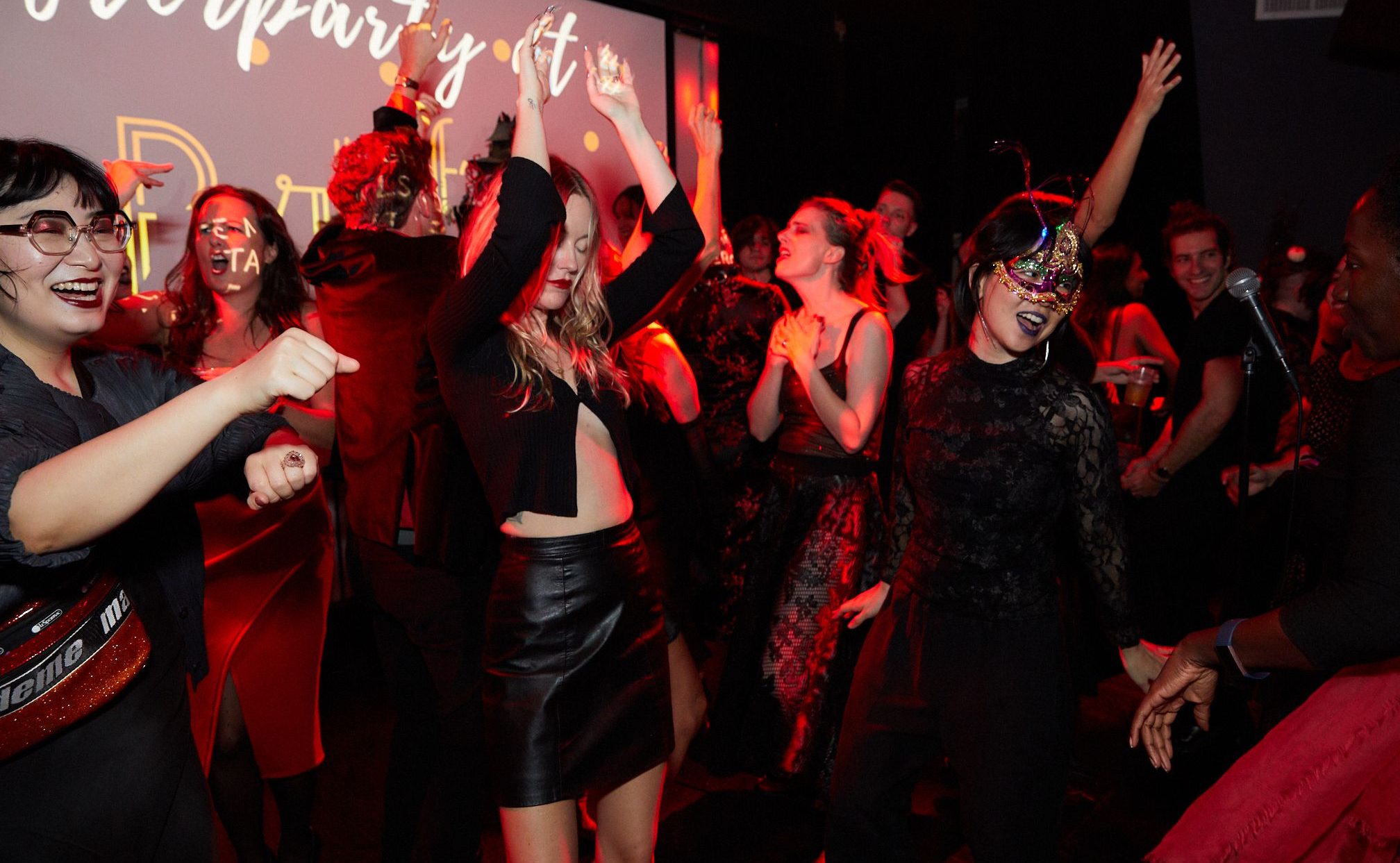news
Salute Their Shorts! — Selected Shorts: An Evening with One Story Magazine

1. One Story staffers! Telia Sinkinson, Editorial Intern; Adina Talve-Goodman, Managing Editor; Pei-Ling Lue, Contributing Editor; Andrew Heaton, Editorial Intern. They posed, then Stephen ran to get a lens, to which they re-posed and said, “Maybe we should hug so we look like we like each other.” 2. Pretty, pretty stories.


Some things I realized on my way to Symphony Space for “Selected Shorts: An Evening with One Story Magazine” last night: the 96th Street 1/2/3 stop is really pretty, Alec Baldwin is going to perform at Symphony Space soon, and their downstairs bar has trivia every Wednesday night. A few days ago, I was looking over the event description and wondered what “performed” meant: Was Joe Morton going to one-act Jim Shepard’s story? Is it possible to one-act Seth Fried’s work? When the evening commenced, it seemed that none of the actors attached to the One Story alumni were going to flounce around the stage. There was only a small table in the middle stage, with a vase of flowers and two cups of water. Instead, they lent their performance talents to the stories, and the whole evening felt like the adult version of story time: classy and a little dressed up… and I even got to drink a beer. The quadruple threat of Barbash/Cavanagh, Shepard/Morton, Fried/Fontana, and Binder/Minifie was a perfect evening of literature-as-performance.
1. Isaiah Sheffer rules. 2. Maribeth Batcha, Publisher, & Hannah Tinti, Editor-in-Chief, of One Story.
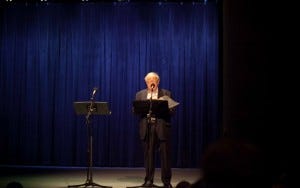
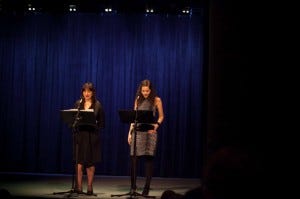
Symphony Space is really pretty. The chairs look old enough to give you that distinguished feeling of going to the “theatre,” but overall it’s a fresh, hip take on a classic performance venue. Isaiah Sheffer was our MC for the evening, and is also the co-host of NPR’s Selected Shorts series, along with One Story’s Hannah Tinti. Sheffer stood on the right of the stage, lit in a soft but bright spotlight, and introduced Tinti and Maribeth Batcha — the key figures behind One Story — with charm and wit: “Each issue has one story, and that’s how they got their name.”
“In 2001 … if there was something you wanted to do all your life, you’d better do it now,” Batcha declared. With $3000, an apartment, hours of stuffing envelopes over bottles of wine, and One Story began existence. In the last 11 years, One Story has published over 170 stories by 170 different authors (they never republish an author) from around the globe. And, as Tinti quipped, “at least half of us know the proper usage of a semicolon.” (I’m still struggling with that one. Someone please e-mail me and explain; please use at least five semicolons in your response.)
1. Tom Barbash and balloons! 2. Barbash-via-Cavanagh, and a bunch of “irritatingly bourgeois people holding drinks.”
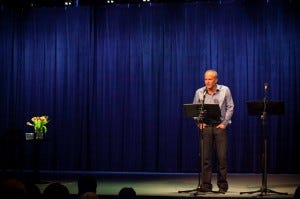
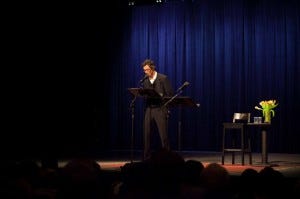
Tom Barbash’s “Balloon Night” was the first story for performance. Barbash grew up on the Upper West Side — our venue’s home and also the story’s — on “the block where they blow up the balloons for the Macy’s Day Parade.” Tom Cavanagh (Royal Pains, Ed), brought Timkin’s sorrow to life. “Timkin’s wife left him on a blisteringly cold Thanksgiving week,” Cavanagh read, “two nights before their annual Balloon Night party.” Cavanagh seemed conscious that he was reading a story, incorporating the lick-of-the-finger in his performance and audibly flipping the pages. It was like watching an awesome radio show. Cavanagh communicated the story’s close third person perfectly. I caught myself looking down, just listening and forgetting to take notes, because he was so good. Timkin’s memory of fights and inside jokes with wife Amy were animated with Cavanagh’s sensitivity for the pause, exclamation, and quiet epiphany. “‘I can’t change what I like just to suit you.’ But, he did that all the time! It was part of being a successful couple, he believed.” Timkin compulsively glances at his front door, looking for his wife, and when she doesn’t arrive, Cavanagh slowed Timkin’s thoughts down and told us in optimistic remorse: “If this was only the start of the darkest part of his life, Timkin marveled at what he’d already been able to make of it.” Exit story to right.
1. Jim Shepard, who is really good at pronouncing “indefagitable.” 2. Joe Morton! I rang his groceries up once.
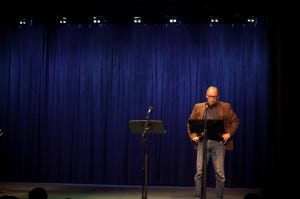
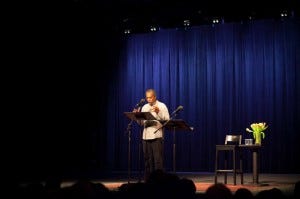
I was particularly looking forward to Joe Morton reading Jim Shepard. Shepard’s work itself is built with urgency and drive, and though Morton is most famous for this (badass!), he started his acting career on Broadway and was nominated for a Tony. Shepard began: “I once gave a reading at Notre Dame in a huge hall like this. To about 15 undergraduates. Apparently [they were] selected for their unresponsive faces.” Morton read a different story than Shepard’s One Story contribution (which was included in each of the programs — woo!) titled “Cretan Love Song.” Characteristic of Shepard’s fiction, Morton gradually accelerated both the plot and emotional drama as our ancient Cretan sits on the beach with his son, just before the Minoan explosion. Morton immediately immersed us in the panic and dread of witnessing a tsunami-size wave get only bigger, along with the psychological terror of the second person narrator. Morton’s hands were flying and his eyes were bugging as Cretan and his son ran for home, fueled by the hope that “though you can’t reach safety, you can reach home.” At one point I thought Morton was going to lose his balance and tip over, and just when I thought he was he exclaimed, “Your time is gone! [Pause.] Thank you.” Gasps and Wow’s abounded in the seats.
1. I really should’ve recorded this. 2. Seth Fried: “In my notes I have Descartes spelled D-A-Y-C-A-R-T. I went to college. Just nervous.”
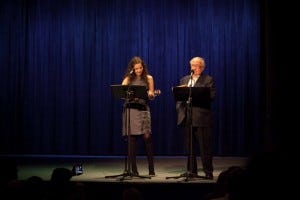
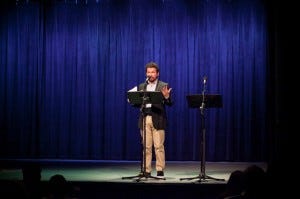
After a short intermission, Sheffer returned to the stage and told us why Tinti was hired for Selected Shorts’ radio program: She plays the ukulele. Tinti appeared, ukulele in tow, and confessed that “[Her] New Year’s resolution was to embarrass myself in public.” They began the most adorable version of Gershwin’s “Let’s Call the Whole Thing Off” I’ve ever seen. (My heart is still with this dude’s version though.)
Simply: Seth Fried is a great writer. At the release party for The Milan Review, I heard him read a story about that guy who’s always the last to leave the party, how everyone guiltily thinks he’s the saddest of the bunch, while still not totally believing that. Well, Fried’s was indeed the saddest, and I think he challenged that audience’s perception of the perpetual partier. So when he began his introduction by saying he was going to “zip through some 18th-century philosophy” for the story “The Adventure of the Computer Program,” I was intrigued. Santino Fontana (View From the Bridge) matched Fried’s tone perfectly. The form of the story was reminiscent of philosophical exegeses, translating how computer programs work through fiction. “An immeasurable amount of elapsed in which nothing happened. Nothing. Nothing. Nothing. … The input continued its attention, [the program] became acquainted with memory.” The program gains consciousness and embarks on a journey for some input on an explanation of consciousness. Instead, he finds: “Existence was just a perpetual collision of memory and what was to come.” I am never telling my computer anything ever again.
1. Fried-via-Fontana. 2. L. Annette Binder likes tall people.
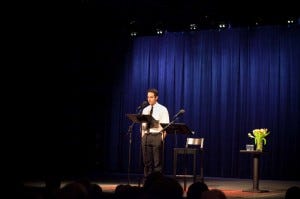
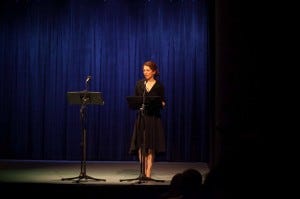
The evening’s final story was “Nephilim” by L. Annette Binder, which was nominated for the Pushcart by One Story and then subsequently awarded it. While an MFA candidate at UCI, Binder heard a story about a woman who continued to grow after adolescence, and drafted this story titled after the giants of the Old Testament. Colby Minifie (Close-up Space) was the youngest of the actors, but her voice narrating a story of stunted youth trapped in an ever-expanding body fit it to a T. “Frida weighed 18 lbs. when she was born. Her feet were each six inches long.” Frida befriends a boy named Teddy, who lives three houses away, and keeps him employed through his adolescence with housework, vicariously living the youth she never “normally” had. “She leaned back in her chair and watched this perfect boy. He held the bulbs like they were porcelain cups and he gently laid them down,” a simple pleasure too small for Frida’s hands. Minifie lowered her voice for the ending, when, years later, Teddy arrives with his son and a jar of flowers. “His face was like a mirror, and it was better not to look.” Damn.
1. Colby Minifie as our nephilim, Frida. 2. Kerry Cullen, a fiction MFA candidate at Columbia, with Joe Ponce, also a fiction MFA candidate at Columbia. They’re in Tinti’s workshop! Woop.
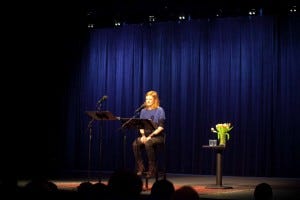
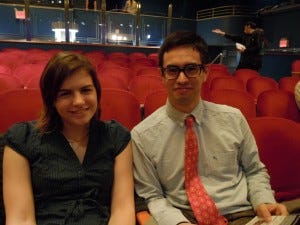
Before Joe Morton tag-teamed in, Jim Shepard noted: “As trade papers fail, that means publications like One Story are carrying more and more of the emotional and ethical weight that all of us need refresher courses in.” One Story’s concept, like the plots of the four stories last night, is deceptively simple and quietly massive. One story in the mail every three to four weeks to digest and experience is reason enough, but it is the “indie spirit” of One Story and its peers that allows for such narratives to be shared with the reading public. Subscribe to One Story here. Check Symphony Space’s calendar for upcoming Selected Shorts and other events, and tune into WNYC every Friday for the radio program.
**Big ups to Stephen Schuyler for being my +1, EL’s photographer for the event, and an all-around solid dude!**
***
— Ryan Chang is from Orange County, CA and lives in Brooklyn. He is the Staff Writer for The Outlet, and his work has previously appeared in Thought Catalog. He is in the internet here and here.







